marine safety and training business expands in the midlands
Birmingham & Midland Marine Services Ltd offer a wide portfolio of services to the Civil Engineering, Rail, Utilities, Environmental, and Ecology sectors, working in an open water environment.
- Occupational Water Safety & Rescue Training
- Procurement, Project & Safety Management
- Commercial, Support, Safety & Rescue Vessel Services
- Boat Coxswain & Crew Training – Workboat, Powerboat & Safety /Rescue boat
Companies and organisations working on, beside or above open water are faced with a multitude of logistical complications; in fact, a ‘minefield’; ranging from obtaining workboats, floating welfare vessels, pontoons, safety boats, licences, permissions, marine risk assessments, obtaining lifejackets and rescue equipment, plus sourcing the appropriate training specific to the environment in which they will be operating.
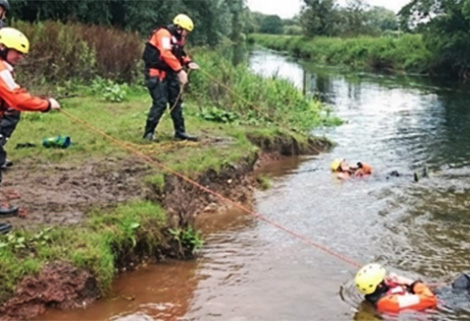
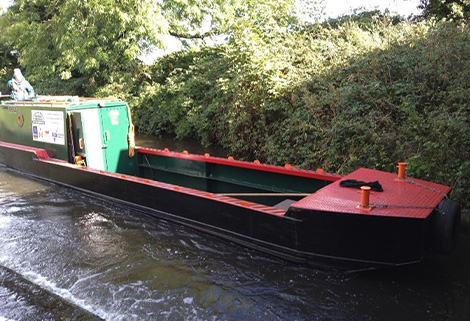
Further complications can include providing emergency first aid support at these often-inhospitable waterside locations, seldom easily accessible by ambulance
Training requirements can be confusing for Human Resources and Health & Safety Managers: The HSE, DEFRA and the CDM Regulations 2015 all have a requirement for training and the levels of training required also change depending upon the location of the watercourse, the specific environment and the expected level of water contact those personnel are faced with.
Potentially having to contract a specialist safety team to cover the water margins is a further complication; to what level should the rescue teams be trained? with what equipment, licences, and insurances?
Does this sound like a stressful day at the office?
In steps Birmingham & Midland Marine Services Ltd.
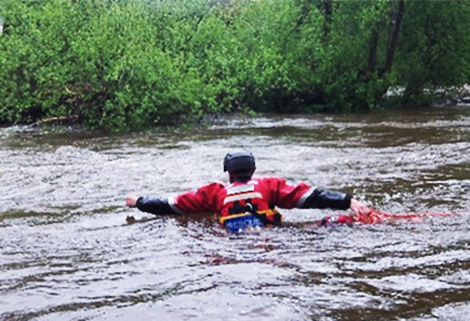
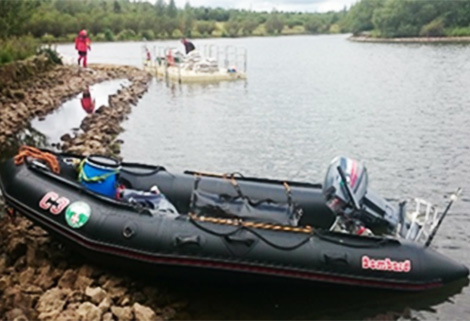
Headed by Rich Gray, Maritime & Coastguard Agency Boat Master, ‘Water’ Rescue Instructor and Rescue Boat Operator with 23 years’ experience in the industry; Birmingham & Midland Marine Services was established in 2013 and expanded as a Limited company in 2020 in the middle of the Covid 19 pandemic.
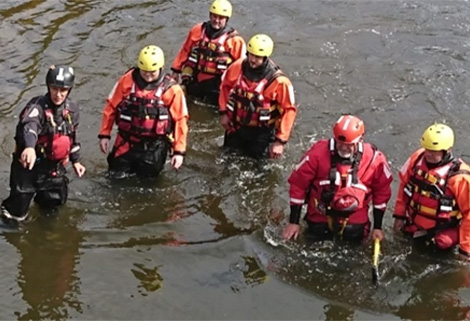

As a small yet niche business servicing the civil engineering, rail, utilities, environmental & ecology sectors, supporting & training the ‘Search & Rescue’ sector, clients are assured of a one-stop-shop approach to having the project supported from the initial tendering process to completion.
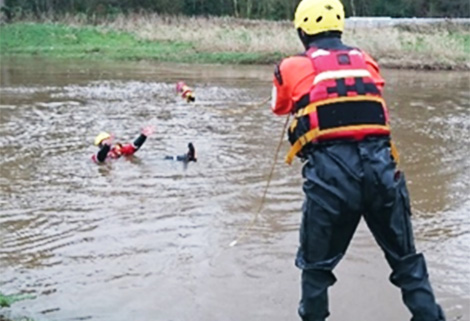
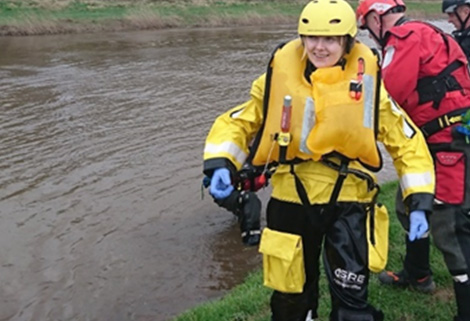
Registered with Achilles on the National Procurement Framework, the Commercial Boat Operators Association, the Inland Waterways Association and British Marine, approved trainers to the Canal & River Trust and the Environment Agency, the companies’ credentials are assured.
Current contracts include Marine Support of a major National Infrastructure Rail project and training provision is available for National Flood Resilience personnel. Canal & River Trust approved contractors with ties to the pontoon and specialist marine plant sectors.
Procurement and provision of specialist floating equipment, access solutions, and safety management systems and training all in one package.


Approved Training providers for Outreach Rescue, The Maritime & Coastguard Agency, the Royal Yachting Association, the Royal Life Saving Society and the Canal & River Trust’s ‘in-house’ training scheme,’ CAATS’, a broad portfolio of courses are on offer.
Sector specific training can be advised upon, and accredited courses delivered ‘in-house’ by our specialist training team. Aquatic PPE and safety / rescue / medical equipment can be procured for clients from our framework of suppliers. Workboat and Rescue boat training a speciality.
Recent courses developed by Birmingham & Midland Marine Services include a bespoke ‘Small / Inflatable Craft’ course for the Canal & River Trust’s Craft Licencing Department and an ‘Inland Waters – Rescue Boat Operator’ course, certificated by Outreach Rescue.
This new rescue boat course bridges the gap in the safety / rescue boat training sector. Basic Powerboat handling and ‘sailing club’ type ‘Safety Boat’ qualifications were not designed to satisfy commercial or industrial safety / rescue vessel role requirements -the DEFRA Module 4) Rescue Boat qualification which is utilised by Fire & Rescue specialists in ‘swift-water’ and flood environments is ‘over-kill’ for the requirements of a ‘standard’ safety / rescue boat crew working in many land-locked counties, hence the development of a far more suitable and accessible training course.
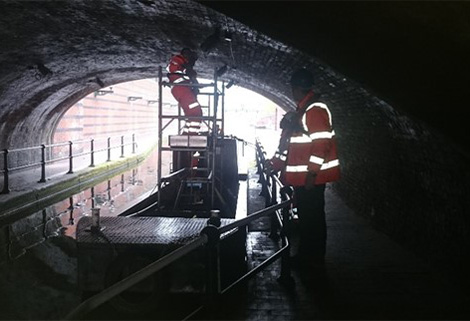
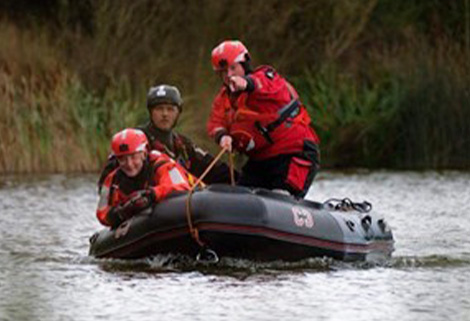
This new RBO course is ideally suited to companies wishing to provide an element of in-house support on the water, derived from the higher-level course yet excluding the fast-flowing water, tidal and coastal considerations. The syllabus includes casualty management, recovery, shallow-water operations, capsize drills and search considerations.


For those companies looking to provide their personnel with relevant First Aid Marine Environment training, encompassing elements such as the protocol for drowning within CPR, crushing, amputations, use of tourniquets, cold water shock, hydrostatic squeeze and vasoconstriction; elements not found in a ‘standard’ First Aid at Work course, Birmingham & Midland Marine work with our TQUK registered partner to provide bespoke marine environment Level 3 TQUKS regulated (RQF) Emergency First aid at Work, First Aid at Work and First Responder (IPOS) courses. 1, 3 and 5-day courses available. The higher-level award also covers spinal management and oxygen therapy.
Royal Yachting Association VHF radio and First Aid courses also available at Gailey Wharf Training Centre with our partnering trainers.
Occupational Water Safety & Rescue courses are, in the main delivered via the Outreach Rescue DEFRA training programme. Based upon the DEFRA Flood Rescue Concept of Operations documentation, and commercial river-based courses are based around the Annex ‘H’ syllabus, satisfying the Environment Agency as well as DEFRA. Basic DEFRA Module 1), Module 2) Water Rescue First Responder and Module 3) Water Rescue One Technician courses also available in ‘closed course’ format by arrangement.
Commercial Boat courses include workboat oriented RYA Inland Waterways Helmsman Certificate training, Powerboat Level 2, Rescue Boat Operator and Maritime & Coastguard Agency Boat Master training, including ‘Boat Fire Safety’ and ‘Water Safety & Personal Survival’ ancillary courses.
With the company’s primary base being canalside at Gailey Wharf on the Staffs & Worcester Canal, Base-Two at a privately owned stately home with sixty-acre lake and licences and permissions in place for various other venues including National Trust property, our training areas a both diverse and dynamic: the marina, farm shop and cafe at one of our training venues in Great Haywood, Staffordshire is owned by the descendants of the inventor of the lifejacket!
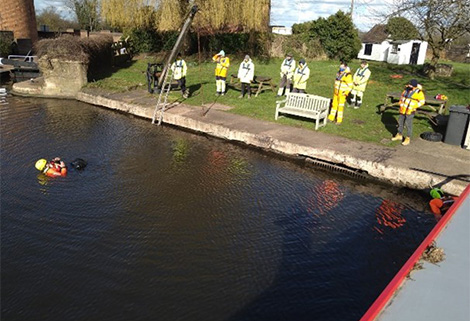
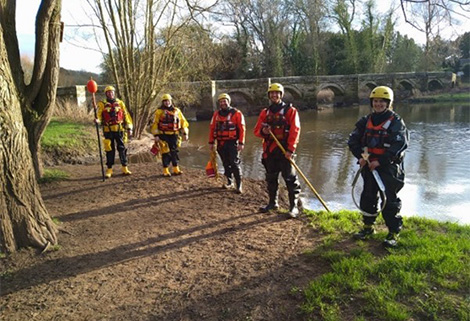
New courses are being developed and accreditation is underway, examples include the ‘Inland Waters Marine Operator Programme’. The IWMOP is full suite of courses available as a package and aimed at those looking to break into the inland and open water commercial sector is currently being developed for roll-out during the Spring of 2022. The ‘IWMOP’; is a four-week programme developed to take a novice to a sufficient level of competency to begin working in this expanding sector.
Another course under development is our ‘Workboat’ course; specifically designed to provide relevant training and experience to commercial skippers and coxswains, working on category ‘A’ & ‘B’ waters, canals, and non-tidal rivers. Covering craft ranging from small inflatables, landing craft, displacement workboats, pusher tugs and towing operations. Again, breaching a gap between a leisure oriented RYA Inland Waterways Helmsman licence and a full Maritime & Coast Guard Agency Boat Master’s Licence.
A ‘Rescue & Recovery from Lock Chambers’ course and a boat-based HIAB Operator course are also planned for the 2022 season.
Further information can be found on the company website: www.midlandmarine.co.uk and the Management team are always happy to invite potential clients to their Gailey Wharf canalside depot or our second training centre and event location at the Chillington Estate in Staffordshire to discuss their requirements.
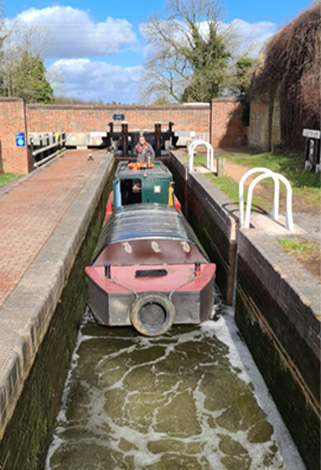





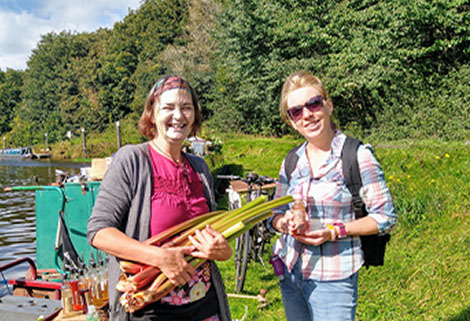 Consider Sam Keay, owner of Gangplank Spirits, whose loyal customers chase her around the countryside, bringing wild-gathered fruits in season to swap and flavour her gins and cordials. For years Sam says she was welcome wherever she went. With the pandemic and challenging times, however, she finds herself increasingly confronting licensing officials — five times this year — demanding she have a local street traders license, obliging her to cease doing business and move on down the Cut.
Consider Sam Keay, owner of Gangplank Spirits, whose loyal customers chase her around the countryside, bringing wild-gathered fruits in season to swap and flavour her gins and cordials. For years Sam says she was welcome wherever she went. With the pandemic and challenging times, however, she finds herself increasingly confronting licensing officials — five times this year — demanding she have a local street traders license, obliging her to cease doing business and move on down the Cut.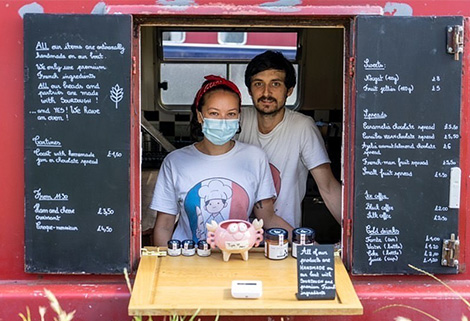 Lindsey and Jeremy Morel, owners of the Floating Boulangerie, are the exception that proves the rule. Based in Kings Cross during lockdown, customers queued for two hours to buy their bread. Their calendar was crammed with £20 breakfast reservations. They were the picture of a successful enterprise, with thousands of followers on Instagram and testimonials from people who’d cycle 30 km to buy a croissant. Film students made videos about them. But lockdown ended and CRT demanded they relocate far from Central London.
Lindsey and Jeremy Morel, owners of the Floating Boulangerie, are the exception that proves the rule. Based in Kings Cross during lockdown, customers queued for two hours to buy their bread. Their calendar was crammed with £20 breakfast reservations. They were the picture of a successful enterprise, with thousands of followers on Instagram and testimonials from people who’d cycle 30 km to buy a croissant. Film students made videos about them. But lockdown ended and CRT demanded they relocate far from Central London. 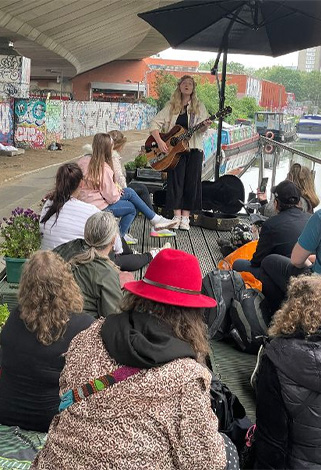 That’s the essence of Brigadoon!, which launches this week. Inspired by the mythical Scottish Highland village which magically appears every 100 years, this Brigadoon — with music, theatre, workshops and roving traders — will appear every two weeks along the canal.
That’s the essence of Brigadoon!, which launches this week. Inspired by the mythical Scottish Highland village which magically appears every 100 years, this Brigadoon — with music, theatre, workshops and roving traders — will appear every two weeks along the canal. 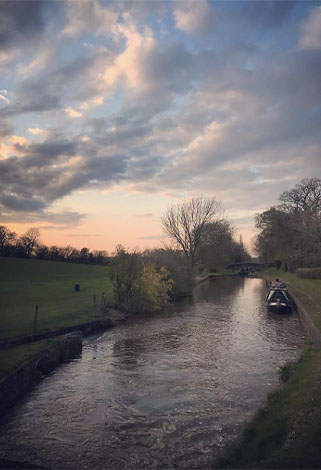
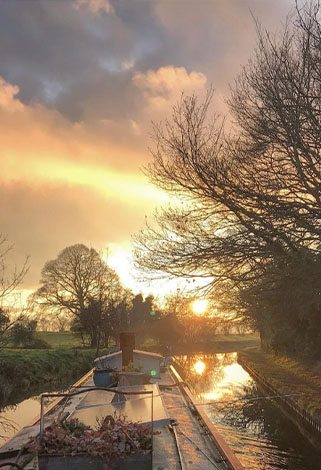
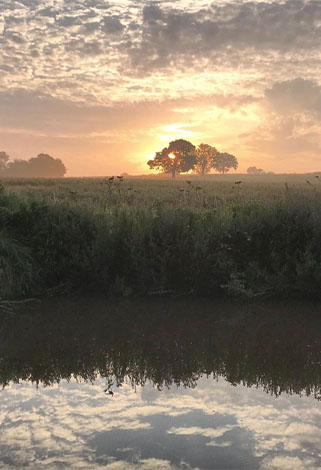
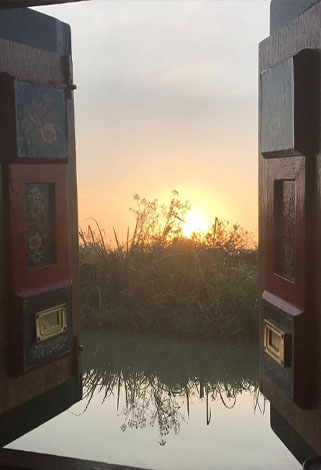
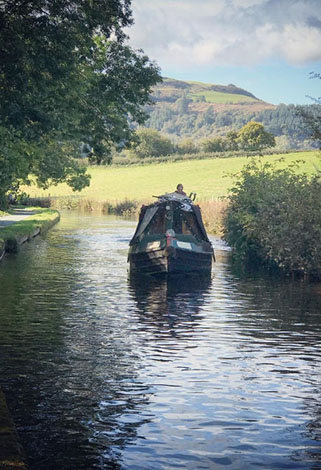
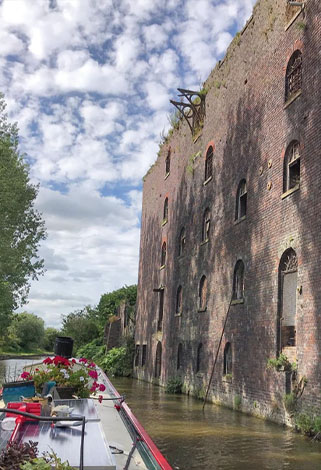
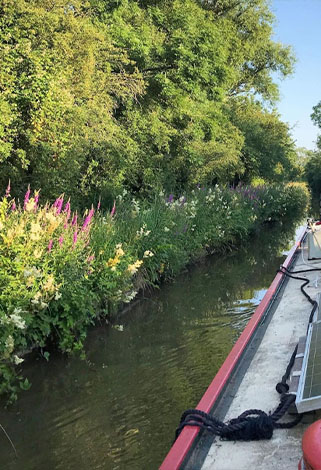
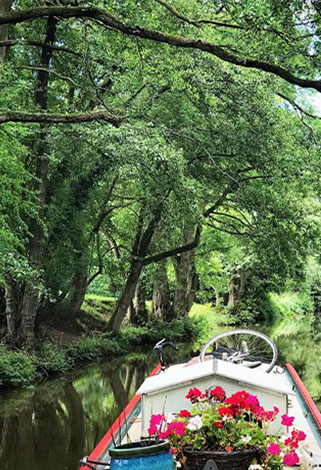
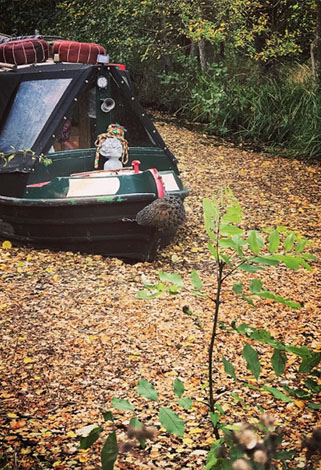
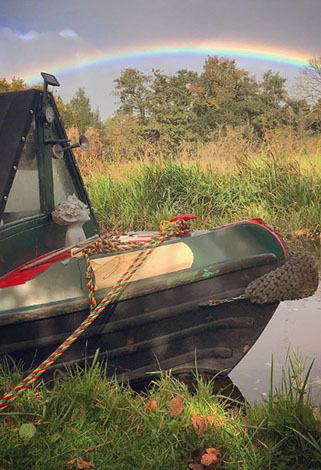
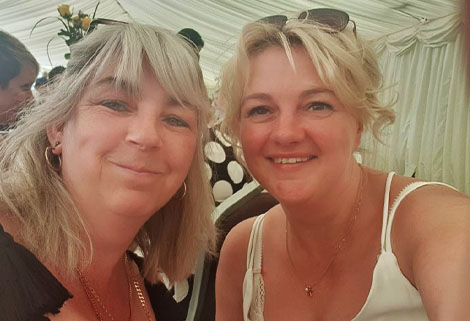 The Malt Shovel in Shardlow was built in 1799 and is set by the side of the Trent and Mersey canal. The free house pub has been run by long time friends Ksenia and Lena since 2016.
The Malt Shovel in Shardlow was built in 1799 and is set by the side of the Trent and Mersey canal. The free house pub has been run by long time friends Ksenia and Lena since 2016.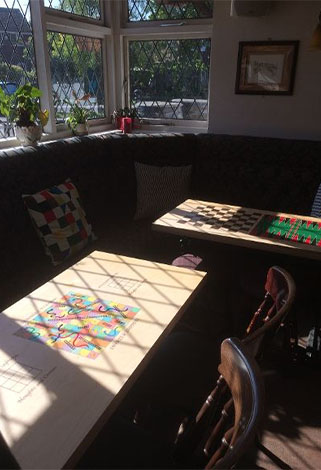 The Malt Shovel retains many of its original features such as the beams and the tiled floors adding character to this charming pub. In the warm weather it’s perfect for sitting outside and watching canal boats and cruisers and the rest of the world go by.
The Malt Shovel retains many of its original features such as the beams and the tiled floors adding character to this charming pub. In the warm weather it’s perfect for sitting outside and watching canal boats and cruisers and the rest of the world go by.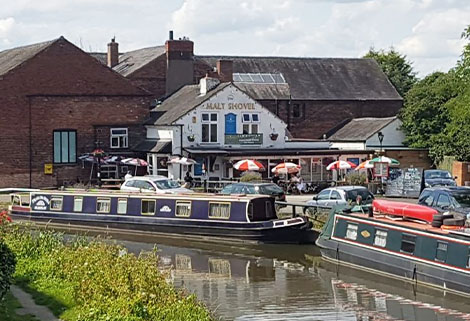 For the many boaters that moor up by the canal side next to the Malt Shovel, Ksenia and Lena can also provide fresh produce if required - 'boaters baskets’ - breakfast basket, ploughman’s basket - very handy if you want to stock up before moving on.
For the many boaters that moor up by the canal side next to the Malt Shovel, Ksenia and Lena can also provide fresh produce if required - 'boaters baskets’ - breakfast basket, ploughman’s basket - very handy if you want to stock up before moving on. Ksenia and Lena welcome you to the Malt Shovel in Shardlow.
Ksenia and Lena welcome you to the Malt Shovel in Shardlow.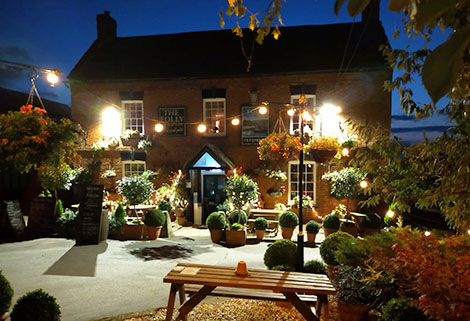 The Folly at Napton must be one of the most famous pubs on the cut.
The Folly at Napton must be one of the most famous pubs on the cut. But perhaps one of the major attractions is the dominant presence of the landlord, Mark. With his handlebar moustache, waistcoats, neckerchief and welcoming smile, he must be one of the true characters of the cut.
But perhaps one of the major attractions is the dominant presence of the landlord, Mark. With his handlebar moustache, waistcoats, neckerchief and welcoming smile, he must be one of the true characters of the cut.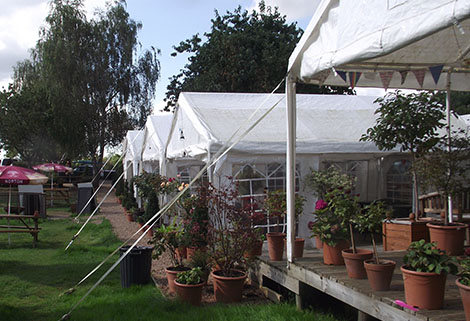
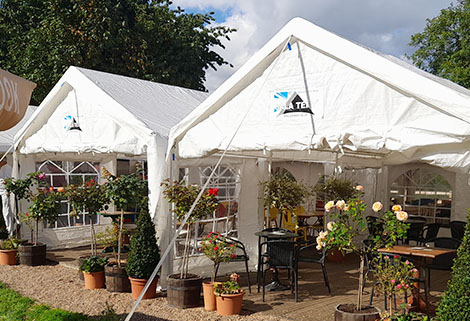
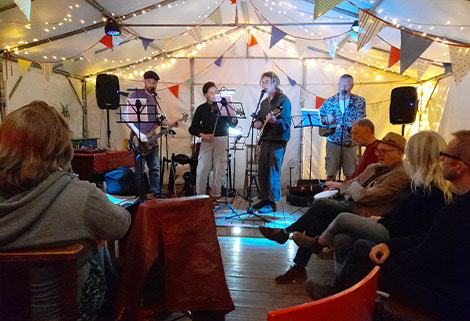
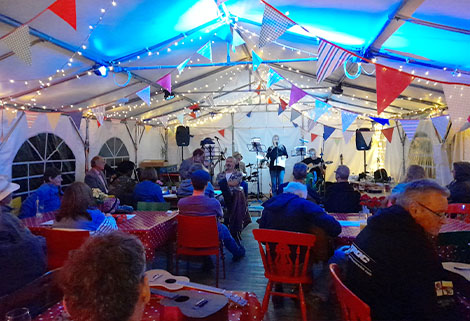
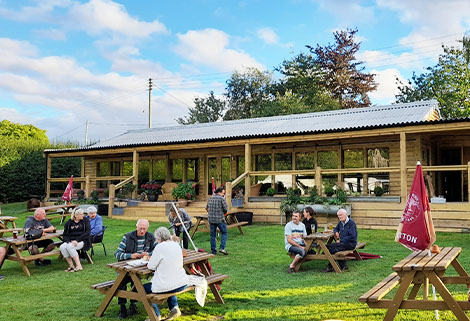
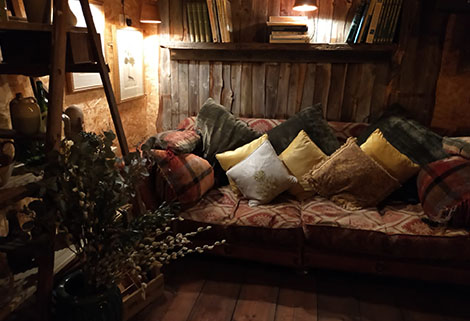
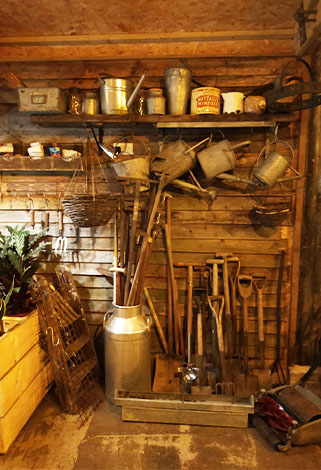
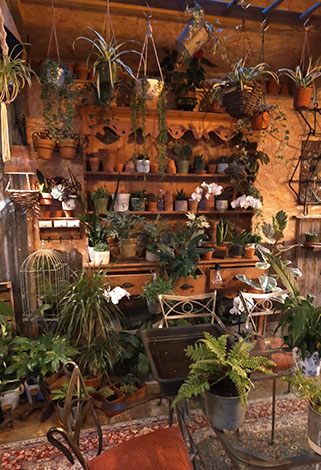
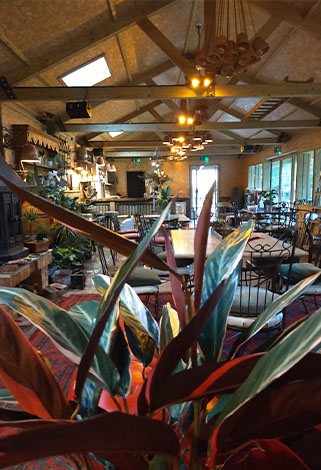
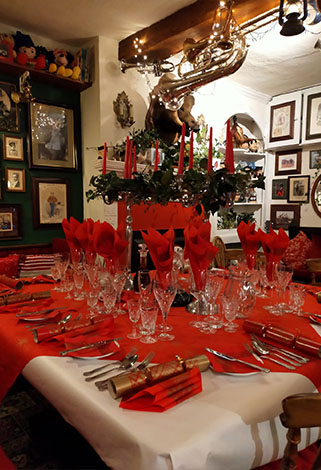
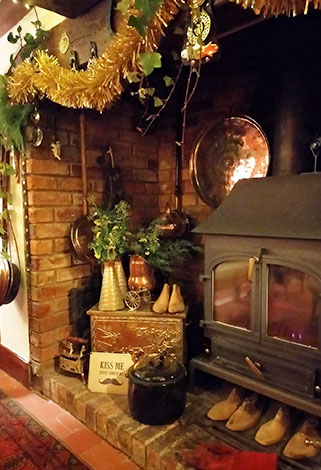
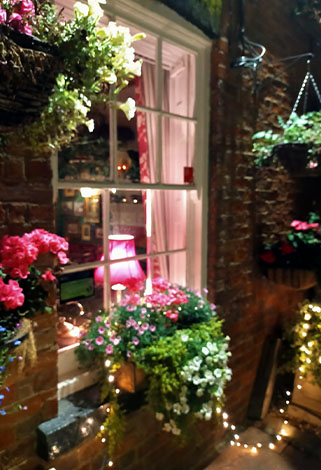
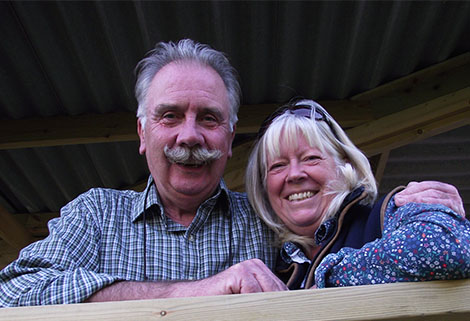 Mark and Caroline will always hold a welcome for you at the Folly Pub, Napton. There are plenty of moorings nearby, and a very ample carpark if you are visiting from further afield. You can expect the very best in food, drink, company and live entertainment.
Mark and Caroline will always hold a welcome for you at the Folly Pub, Napton. There are plenty of moorings nearby, and a very ample carpark if you are visiting from further afield. You can expect the very best in food, drink, company and live entertainment.